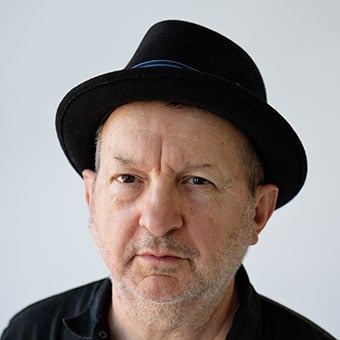
Mark-Anthony Turnage
An introduction to the music of Mark-Anthony Turnage
by Anthony Burton
In his fifties, Mark-Anthony Turnage is one of the best known British composers of his generation, widely admired for his highly personal mixture of energy and elegy, tough and tender. His productivity is impressive, the result of single-minded concentration on the job in hand. But his solitary hours at his desk are broken up by fruitful interaction with the musicians who are to interpret his works. The methods he has established over the years depend heavily on co-operation: collaborations with soloists in the creation of new works which are both showcases and challenges; creative partnerships with improvising jazz performers; residencies and close associations with orchestras and opera companies which allow him to try out his scores under workshop conditions before he brings them – often with radical changes – to their final form.
Such flexibility is hardly the mark of a doctrinaire modernist, for whom the material and processes of a work dictate every last detail. However, Turnage is entirely familiar with the modernist tradition, through his studies with Oliver Knussen, John Lambert and Gunther Schuller – though this has been tempered by the influence of his more pragmatic English predecessors Britten and Tippett. The musical personality shaped by these diverse factors is a distinctive mixture of aggressive and lyrical qualities. The aggression is conveyed by sharp, irregular percussive accents, recognisable throughout his output from his operatic breakthrough Greek to recent works such as the clarinet concerto Riffs and Refrains. The lyricism, often over an uneasy accompaniment, takes the form of sustained melodic lines with something of the free-floating nature of a jazz solo.
Turnage’s assimilation of different elements of jazz and popular music does not represent, as it does for many of his American contemporaries, a harking back to the music he grew up with: his childhood radio listening was devoted to classical music. It was not until his student years that he discovered jazz-funk and soul music. This led him to explore the work of Miles Davis, and he is now fully versed in writing jazz compositions and arrangements. The wider world of rock and pop music impinges on his "serious" compositions in sometimes unexpected ways – for example, in a string quartet, Twisted Blues with Twisted Ballad, which includes two treatments of Led Zeppelin numbers. More predictably, perhaps, his love of different popular genres shines through his opera Anna Nicole, investing its tragicomic story with American local colouring and a "feel-good factor" which is typically ironic.
But it is characteristic of Turnage that in the wake of Anna Nicole he composed two major works exploring entirely different areas of musical expression: the Cello Concerto harking back to English tradition, with allusions to Elgar; the ambitious Speranza full of melodies inspired by various folk traditions. These new departures reflect the questioning, pluralist outlook which has led Turnage to say in an interview: "I don’t want to write the same type of music. I want to push myself." And wherever his future explorations may take him, the results will surely continue to attract, intrigue and entertain audiences.
Anthony Burton, 2013
(Anthony Burton is a former BBC Radio 3 producer and presenter, now a freelance writer on music.)
